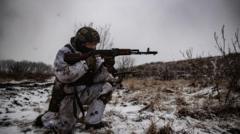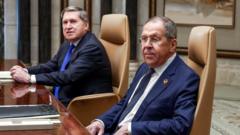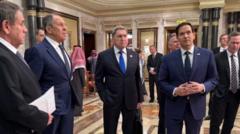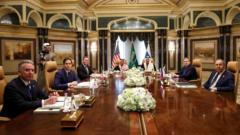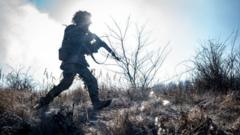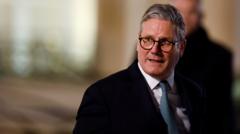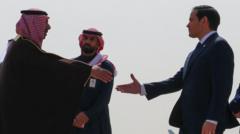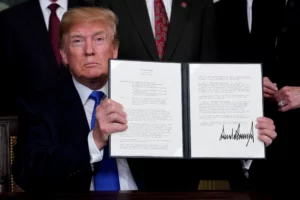Sir Keir Starmer emphasizes the need for a united front between Europe and the US while Ukrainian President Zelensky calls for more European autonomy in defense amidst shifting allegiances.
**European Leaders Convene Emergency Summit Amid Concerns Over US-Russia Negotiations**
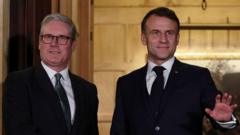
**European Leaders Convene Emergency Summit Amid Concerns Over US-Russia Negotiations**
European leaders are set to meet in Paris to discuss strategic responses to the ongoing war in Ukraine, as tensions rise over Donald Trump's involvement in the peace process.
European leaders are preparing to attend an emergency summit in Paris focusing on the war in Ukraine, prompted by rising concerns about Donald Trump's role in the peace negotiations. British Prime Minister Sir Keir Starmer, expected to participate, described the situation as a "once-in-a-generation moment for our national security," highlighting the necessity for Europe to take on a larger role within NATO.
The discussions come in the wake of statements from Trump's special envoy to Ukraine, Keith Kellogg, indicating that while European leaders may be consulted, they will not be part of the US-Russia talks aimed at ending the conflict. US officials are scheduled to meet with Russian and Ukrainian representatives in Saudi Arabia shortly.
Starmer plans to act as a liaison between US and European leaders, emphasizing the importance of a coordinated response to the Russian threat in Ukraine. His upcoming visit to the White House at the end of the month will provide an opportunity to relay the views of European leaders, facilitating a united stance on the issue.
Ukrainian President Volodymyr Zelensky stressed the creation of a "European army" during the Munich Security Conference, amid fears that US support could wane. He asserted that Ukraine would not accept any peace agreements made without its involvement, especially in light of reports of Trump's intent to initiate talks with Putin.
Recent communications from US Secretary of State Marco Rubio, along with other senior officials, suggest Trump is keen to expedite negotiations, aiming to facilitate a meeting involving Zelensky, Putin, and himself in pursuit of peace in Ukraine. Criticisms of European defense spending were also raised, with UK Foreign Secretary David Lammy urging more investments in military capabilities amid concerns over Putin's enduring influence and potential future conflicts in Europe.
As the landscape of transatlantic relations evolves, both Trump and Zelensky's remarks underscore a critical juncture for Europe, prompting leaders to reassess their defense strategies in the face of heightened geopolitical risks.
The discussions come in the wake of statements from Trump's special envoy to Ukraine, Keith Kellogg, indicating that while European leaders may be consulted, they will not be part of the US-Russia talks aimed at ending the conflict. US officials are scheduled to meet with Russian and Ukrainian representatives in Saudi Arabia shortly.
Starmer plans to act as a liaison between US and European leaders, emphasizing the importance of a coordinated response to the Russian threat in Ukraine. His upcoming visit to the White House at the end of the month will provide an opportunity to relay the views of European leaders, facilitating a united stance on the issue.
Ukrainian President Volodymyr Zelensky stressed the creation of a "European army" during the Munich Security Conference, amid fears that US support could wane. He asserted that Ukraine would not accept any peace agreements made without its involvement, especially in light of reports of Trump's intent to initiate talks with Putin.
Recent communications from US Secretary of State Marco Rubio, along with other senior officials, suggest Trump is keen to expedite negotiations, aiming to facilitate a meeting involving Zelensky, Putin, and himself in pursuit of peace in Ukraine. Criticisms of European defense spending were also raised, with UK Foreign Secretary David Lammy urging more investments in military capabilities amid concerns over Putin's enduring influence and potential future conflicts in Europe.
As the landscape of transatlantic relations evolves, both Trump and Zelensky's remarks underscore a critical juncture for Europe, prompting leaders to reassess their defense strategies in the face of heightened geopolitical risks.


